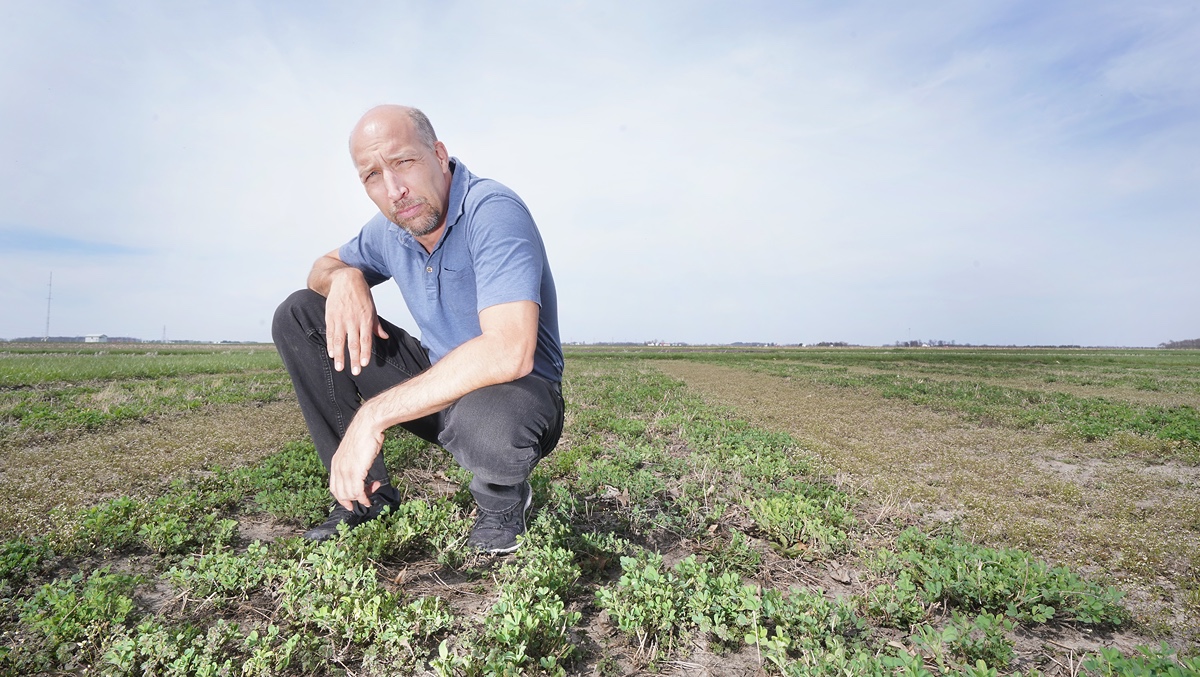Resilient agriculture gets a fresh look
“Resilient agriculture is considering the needs of the present without sacrificing system durability for the future.”
- Christian Krupke, Dean’s Fellow for Resilient Agriculture
Harnessing the power of soil and plants to increase agriculture’s resilience is more important than ever, says Christian Krupke, professor of entomology. “We’re not making any more land,” he explains. “We have to make do with what we have, and that means looking at every opportunity to ensure that every acre is productive for the long-term.”
Farmers — many from families that have been farming for generations — are aware of this, he says. But the same growers are asking what terms like “resilient,” “sustainable” and “regenerative” mean in their operations today and for the generations that will follow.
“Currently, if you’re a farmer and you say you want to get involved in resilient agriculture and implement some novel approaches, it’s very difficult to find out clearly and definitively what your next steps should be, and what the relative pros and cons of different approaches may be,” Krupke says.
In August 2022 he was named the Dean’s Fellow for Resilient Agriculture to provide research leadership aimed at making these steps clearer. He leads a multiyear initiative that brings together research faculty from different disciplines in the College of Agriculture. Their goal is twofold: to conduct long-term research that helps farmers make decisions based on reliable, field-scale data; and to demonstrate novel practices that bolster the durability of the entire agricultural system.
“Some of the practices either are not being tested in a rigorous and systematic way, or the results are not being clearly communicated to growers,” Krupke says. “This is an area where Purdue research and Extension can have real impact. We are already working in these areas, but we can do a better job of working together and getting the information out”
For example, many farmers apply insecticides according to guidelines that may not be applicable, Krupke says. “Many of our action thresholds for pests were generated decades ago. But our hybrids and varieties are far different — they’re much more competitive, durable and it’s harder for pests to get a foothold. Our pest complex has also changed, and in many cases, pests are less abundant ”
Soil health also has become a priority and the College of Agriculture has invested in several faculty with expertise in this area. Actions to prevent erosion, sequester carbon and add organic matter make the soil a reservoir for plants to draw from to resist pests and environmental setbacks. “Many of these aren’t new ideas, but we’ve drifted away from them in favor of quick, easy solutions that may have made sense at the time, often including additional inputs,” Krupke says.

Working on dedicated land owned by the university, Purdue College of Agriculture researchers will describe what resilient agriculture looks like in practice using a systems approach, by combining their collective expertise to deploy tactics chosen in consultation with commodity producers and other stakeholders. Fields incorporating these techniques will occur at field scale over several years to compare traditional and resilient farming practices, and the approaches will change as new information comes to light.
“Our challenge is to do this effectively, consistently and profitably,” he adds. “This group can address that challenge with our collective expertise. A long-term approach including dedicated land to test our approaches, is necessary for current and future researchers to meet the challenge.”
Baseline data collection in this inaugural year will occur on 102 acres at Purdue’s Agronomy Center for Research and Education and on additional acreage at Purdue Agricultural Centers. It will include traditional crops like corn and soybeans, and horticultural crops that are economically important in the state. The overall study design will compare paired, adjacent fields: one farmed using common, traditional methods; and the other with techniques that researchers, farmers and conservation groups collectively characterize as resilient. Researchers will measure such parameters as soil health, soil carbon, beneficial and pest insects, pathogens, weeds and yields per acre over time.
The study will show if practices used as a matter of course from year to year are effective — a tie to Krupke’s research and extension programs in Indiana and regionally for nearly 20 years. For example, some of his work has focused on the benefits and costs of neonicotinoid use on corn and soybeans, as well as research focused on how the efficacy of highly successful and popular Bt corn hybrids can be preserved.
Now Krupke hopes results from this wider study, as well as its interdisciplinary approach to “being more judicious about everything we do,” will bring clarity and guidance for growers and other stakeholders who want to take next steps in resilient agriculture.






